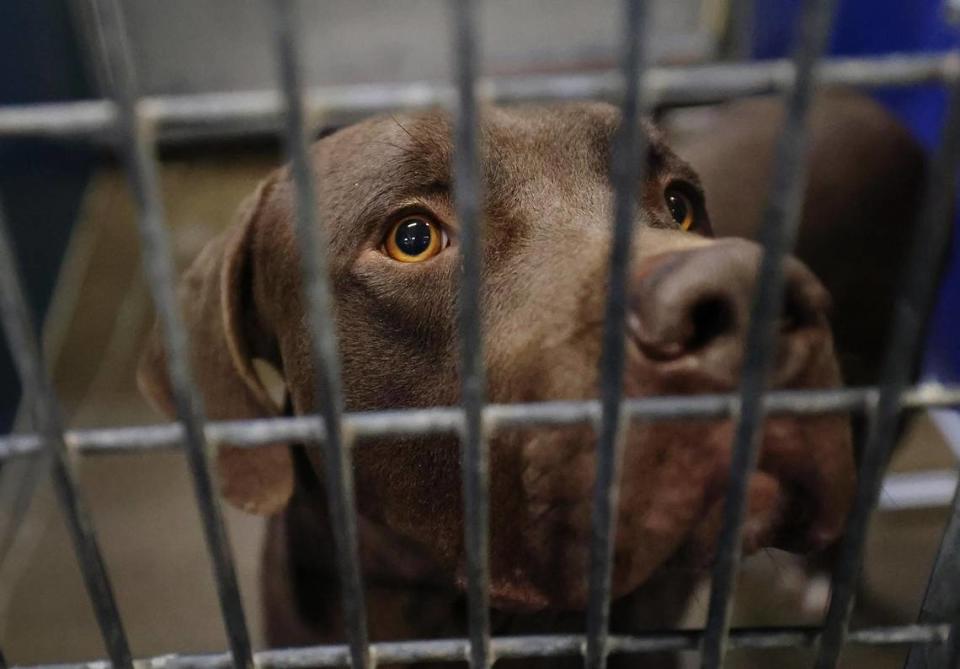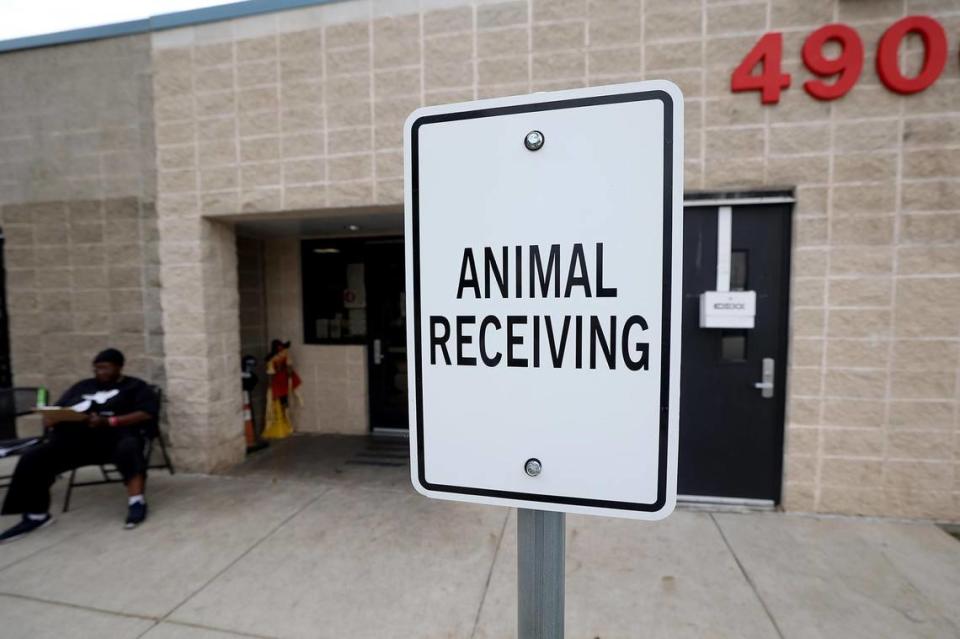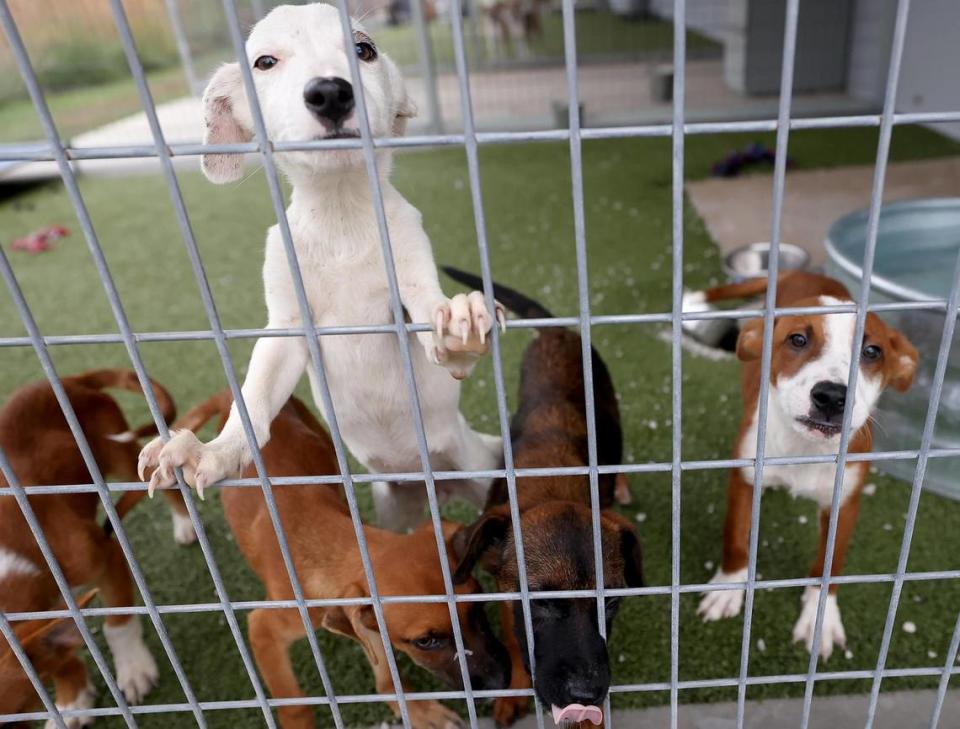Fort Worth animal shelters are overrun. We asked city leaders what they’ll do about it.
Some Fort Worth leaders are calling on the public help solve the overcrowding and high euthanasia rates at the city-run animal shelters. But several volunteers and fosters worry that the city isn’t adequately addressing its own responsibilities for shelter operations.
Fort Worth’s two city-run shelters have been severely overcrowded for months, at or nearing capacity every day. In large part due to that overpopulation, the shelters’ euthanasia rates have increased significantly over the past year, with hundreds of animals — some of them adoptable — killed each month, the Star-Telegram previously reported.
Shelter staff have pointed to overpopulation and high surrender rates across the region. After strong interest in adoptions in 2020 and 2021, now the numbers of surrenders and stray pickups are overwhelming the shelters. Other shelters across the country are facing the same overcrowding problems, including nearby in Dallas.
Some Fort Worth shelter volunteers and fosters, though, worry that the city’s animal overpopulation issues are exacerbated by what they describe as chaotic shelter management and haphazard euthanasia selection protocols, the Star-Telegram reported in early November. Those people have called for intervention from the city council.
The council earlier this year approved a budget with six new shelter positions, and several council members have called for the community to step up to help the struggling shelters. The council has not publicly broached the topic of any additional changes to or support for the shelter system.
[MORE: Fort Worth’s animal shelters need your help. How to adopt, foster or volunteer today.]
The challenges facing Fort Worth’s shelters are part of a massive and unwieldy animal crisis across the country.
Maura Davies, the vice president of marketing and communications at the SPCA of Texas, said that shelters and animal welfare organizations nationwide are coping with overpopulation and the tack-on issues that come with it. The problem is complex and multi-faceted, Davies said, and solutions will require partnerships between the community and animal welfare agencies, including Fort Worth Animal Care & Control.
Davies pointed to a wide range of potential solutions, including more support for owners who’d like to keep their pets and increasing spay and neuter rates. Ramping up those efforts begins with conversations, she said.
“I truly think it’s going to take collaboration, kindness, understanding and support on the part of everybody involved to get to a solution, and it’s a national conversation within welfare circles,” Davies said.

New jobs at the shelter
Fort Worth council member Jeanette Martinez asked during a meeting in early November if the city’s Animal Care & Control could be placed on a future agenda for discussion.
Mayor Mattie Parker responded that council members have heard from a number of volunteers who are “very upset” and said that she thinks it’s important to communicate what the shelters are doing right. (The Star-Telegram filed a public information request for complaints against the shelter in the last six months. The city withheld the vast majority of those records, indicated that the records may be confidential under state law and requested an opinion from the state Attorney General’s office.)
Martinez also said at the meeting that the council could discuss “more support with spay and neuter,” and Parker agreed.
The issue has not come up again during the two council meeting since then.
The Star-Telegram in November contacted the mayor and each council member to ask whether they have any plans to take action, as volunteers would like to see. A city spokesperson responded instead, with a lengthy emailed statement.
In the statement, spokesperson Reyne Telles underscored the work that the city has already started to improve the shelters. He pointed specifically to the budget for the 2024 fiscal year, which the council approved in September with funding for six new positions for Animal Care & Control. The new positions — three at each shelter — include a volunteer coordinator and a communication specialist.
“Faced with a market that is saturated with adoptable pets and a shrinking demand, we have and will continue to change our strategies,” Telles’ statement said.

Telles’ statement emphasized, too, that the city cares deeply about the fate of the animals.
“As an organization, we do have distress and concern related to the shelter’s euthanasia rate. We are, and will continue to be, strong advocates for progressive animal welfare programs and positive live release outcomes,” the statement said. “Unfortunately, the trend of high intakes and lower adoption rates is affecting nearly every U.S. shelter.”
In the statement, the city also encouraged residents to work with the shelters, by adopting animals, fostering or volunteering.
‘Irresponsible pet owners’
In addition to the city’s emailed statement, the mayor and two of the other 10 council members — Macy Hill and Gyna Bivens — responded to the Star-Telegram’s request for comment on the shelters’ overpopulation and euthanasia rates.
After the Star-Telegram first reported on the problems in early November, Hill penned an opinion column for the newspaper calling on the community to help the city’s shelters. She wrote that animal welfare is among her priorities in office, and she urged people to donate, adopt or volunteer. When the Star-Telegram then asked Hill if she had any specific action in mind for the shelters, she responded over email that “this is a problem that will take the entire community to address.”
“I am in active conversations with stakeholders; both within the city, as well as local non profit organizations, to continue working towards achieving a higher live release rate,” Hill wrote.
She encouraged community members to get involved this holiday season, by donating to organizations or by adopting animals, sharing social media posts or volunteering.

Parker, in an emailed statement sent by a spokesperson, emphasized factors outside of the shelters’ control that are contributing to the overcrowding and euthanasia rates. She said she and the city are committed to improving the situation, but did not provide specifics on what that might look like.
“This is a distressing issue, but I am confident that we can and will overcome these hurdles and bring the live release rate back up again, not only through the work of our team of passionate staff and volunteers, but also as we work to promote greater awareness, education, and action around responsible pet ownership for our residents and community,” Parker wrote in the statement.
Bivens, in an emailed statement, was the bluntest. She pointed back to the city statement provided by Telles, and also called out community members for failing to do right by their pets.
“Animals don’t wander around and end up at a City of Fort Worth shelter, the problem stems from a preponderance of irresponsible pet owners who fail to properly care for their pets,” Bivens wrote in an email.
‘Out of sight, out of mind’
Several shelter volunteers and fosters said they don’t feel the city and council members’ responses are adequate.
One volunteer, who requested anonymity so as not to interfere with their work with the shelter, said it “feels like a cop out that they say the community needs to step up.”
“The city needs to play a part in that mindset change of the community rather than just point fingers,” the volunteer said.
Sam Hulse, another volunteer, said the shelter staffs are “amazing.” But they need more support from the city, he said, in the form of an updated website, a better experience for potential adopters and increased outreach to the public.
“I do believe it is truly out of sight, out of mind for the city people that are making so many decisions that affect it,” Hulse said. “And I think they’ve created this ‘It is what it is’ mentality, rather than ‘How can we make it better?’”
[MORE: Fort Worth’s animal shelters need your help. How to adopt, foster or volunteer today.]
For more information on how to get involved with the city shelters — through adoption, fostering or volunteering — visit www.fortworthtexas.gov/departments/code-compliance/animals.

